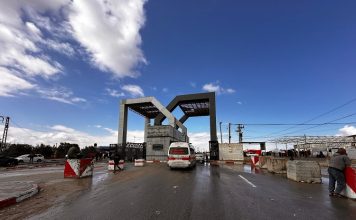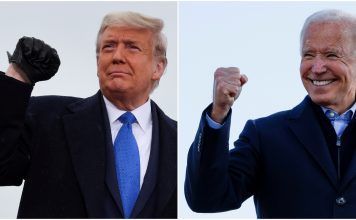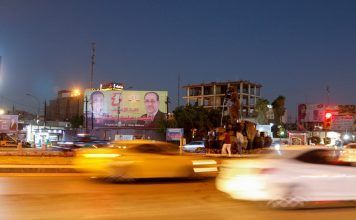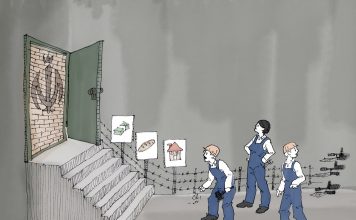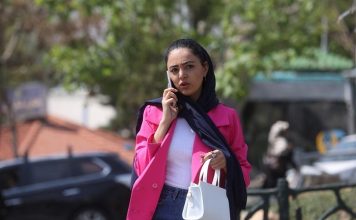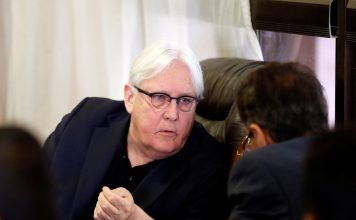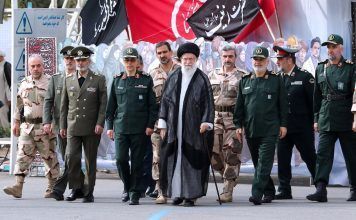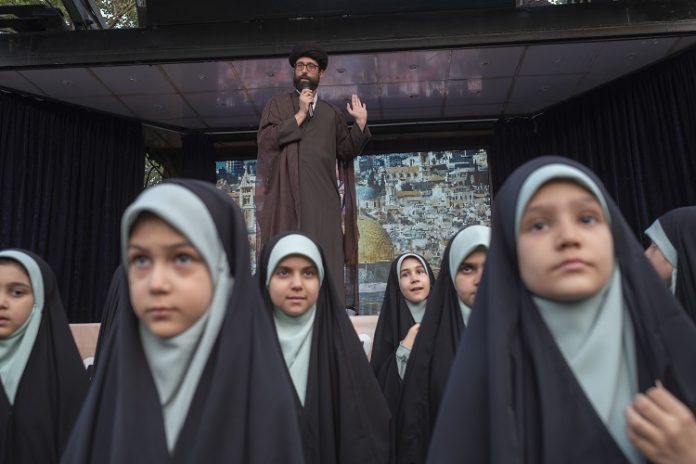
By Kayhan Life Staff
The Iranian government has replaced nearly 20,000 school principals this year, Iran’s Minister of Education, Rezamorad Sahraei, has said.
“To transform our schools, nearly 20,000 school principals have been replaced this year,” the Iranian Students News Agency (ISNA) reported on Sept. 21, quoting Minister Sahraei. “Also, 7,000 additional schools have been marked for the same change. We will reform 5,000 schools this year.”
Mr. Sahraei announced the massive removal of school principals at the closing ceremony of the 14th Congress of the Union of the Islamic Student Association, marking the start of the Sacred Defense Week (commemorating the 1980-88 Iran-Iraq War).
[aesop_image img=”https://kayhanlife.com/wp-content/uploads/2023/09/daneshamoozan.jpg” panorama=”off” credit=”#iranprotest/KL” align=”center” lightbox=”on” captionsrc=”custom” caption=”School girls protesting against mandatory hijab, Iran. ” captionposition=”left” revealfx=”off” overlay_revealfx=”off”]
“All schools selected for reform are standard and government schools,” Sahraei noted. “God willing, [the measure] will instil a new spirit in these schools, which will work as a model for all other educational institutions in the country.”
“The enemy knows it cannot use ‘hard force’ against us because we are alert and strong,” Sahraei asserted. “However, modern warfare is fought inside minds [soft war], not on borders, which poses an even greater challenge given that it is invisible. That’s why organizing and planning are vital for exposing the truth and revealing the invisible through dialogue.”
“Hardcore revolutionary students must work together, because it was through cooperation that the Islamic Republic’s supporters became invincible after the [1979 Islamic] Revolution,” Minister Sahraei urged.
Sahraei’s “reform” program refers to the government’s “Fundamental Transformation of Education System Document,” which further enhances the pervasiveness of Islamic doctrine in school curriculums.
The Supreme Council of the Cultural Revolution (SCCR) enacted the “Fundamental Transformation of Education System Document” after the Supreme Council of Education approved the scheme.
“The Fundamental Transformation in the Education System Document, which drives its impetus from the Islamic system’s great ideals, must operate within the framework of the [20-year National] Vision of 2025. It will develop Iran into the region’s most prominent economic, scientific, and technological country. While maintaining its Islamic revolutionary identity, the country will inspire the Islamic world and establish constructive ties to the international community,” reads the introduction to the Fundamental Transformation of Education System Document.
The students’ movement has played a significant role in protests in recent years. Despite the Islamic Republic’s relentless efforts in the past four decades to indoctrinate students, the young generation of Iranians has continually challenged the regime, as we witnessed in the national uprising sparked by the death of Mahsa (Zhina) Amini, a 22-year-old Iranian woman accused of wearing “improper hijab,” who lost her life on Sept. 16, 2022, while in the custody of the Morality Police in Tehran.
For years, the Islamic Republic has systematically intimidated, terrorized, and persecuted teachers’ unions. The students’ movement posed a serious enough challenge to the regime, prompting it to overhaul the education system and increasing pressure on teachers, hoping it would curtail future protests and unrest.
The Judiciary has arrested or summoned hundreds of teachers in the past year. While some teachers have been imprisoned recently, others have been suspended, fired, or forced into early retirement.
According to union activists, the government has increased pressure on teachers, blocking their promotion, guaranteed under the “Ranking Law” (moving up the bands and pay scale).
In an article on Aug. 30, headlined “Depriving At Least 80 Teachers Form Ranking,” the Tehran-based Hammihan online newspaper said: “Hammihan understands that in the past year and after the start of protests in September 2022, nearly 80 teachers have not been ranked.”
“Many teachers have not returned to work by the start of the school year in September,” the report added. “Others must leave their job prematurely forever.”
A teacher working as vice principal of a girls’ school in Tehran for the past few years, who was relieved of her post a few weeks ago, told Kayhan Life: “Although a handful of teachers had been passed over for promotion or fired in previous years, prominent teachers and union activists or political activists were rarely arrested. The current situation started at the end of last fall.”
“Teachers have experienced widespread and constant administrative scrutiny and security pressure since last year,” the teacher noted. “Some in school administration with close links to the Ministry of Education’s security department reported on teachers who supported student protests.”
“As a result, those teachers received threats and were prevented from being ranked, moving up the pay scale, being promoted to an administrative position, or were banned from teaching altogether. Many teachers experienced inhumane treatment at the end of last year’s final exams,” the teacher explained.
“I think increasing the pressure on teachers in summer could have stemmed from a belief that they could not organize protests or strikes during the school closures,” the teacher said.
“I have been summoned by the Ministry of Intelligence’s information HQ four times in the past three weeks, even though I have no prior record and have never belonged to a group,” the teacher explained. “They even accused me of being a protest leader. I was returning from a store, holding my small child and several shopping bags, and stopped to watch the crowd shouting slogans.”
“I was in one or two photographs taken by the security agents,” the teacher said. “I got angry, asking them what protest leader would stand on the street, holding their small child and shopping bags. In the heat of the argument, I said if I had the capability and ability, I would become a leader, but I would not accept their accusations based on those photographs.”
“They later inserted the phrase ‘if I had the capability and ability, I would become a leader’ in my file at the Ministry of Education’s security department. The security agencies coordinate their work with security departments of all institutions,” the teacher added.
“Teachers who are summoned are offered bribes and threatened simultaneously,” the teacher explained. “They try to turn teachers into a fifth column [to spy on other teachers] in schools or threaten and demoralize them. The prospect of losing one’s job is the most basic threat. I know some teachers have been threatened with [the safety of] their children.”
“They try to make a person mentally insecure,” the teacher added. “Lacking job security, being constantly monitored, and my family and I facing the prospect of paying a heavy price makes me very insecure.”
Besides the massive overhaul of the education system, including suspending and firing teachers, the government has drafted plans to brainwash students.
Mikael Bagheri, the Director General of the Ministry of Education’s Koran and Prayers, has announced mandatory group prayers in elementary schools, arguing that school principals should be trained in conducting group prayers.
In comments reported by ISNA on Sept 21, Mr. Bagheri said: “The call to prayer will be heard in schools across the country at the start of the school year. A group prayer will be held at a girls’ elementary school in Shahre Ray, in the [northern] province of Tehran on Sept 25.”
Bagheri explained that school principals must assign a person to “correct prayers” so students could get an audio file of the corrections from the Ministry of Education’s “Noorino” website.
Since the nationwide protest last year, the Islamic Republic has launched a series of programs aimed at indoctrinating Iranian youths to stifle any future uprising that may pose a severe challenge to the regime.
In an interview with the semi-official Fars news agency on Aug. 31, 2022, the then Minister of Education, Yusef Nouri, said that, following a directive by Iran’s Supreme Leader Ayatollah Ali Khamenei, the ministry would change the content of 200 school textbooks.
Also, the government is currently hiring seminarians and Basij members (volunteer militias) for the Ministry of Education under the “Fundamental Transformation of Education System Document” scheme.
In comments reported by the Tehran-based Student News Network (SNN) on Sept. 17, Education Minister Reza Morad Sahraei said 11,000 permits had been issued for hiring generalists (classroom teachers or coaches) in August.
According to the job description, generalists (classroom teachers or coaches) in Iran “interact with students on various subjects. Educators and coaches fill multiple roles in promoting cultural and community education. Their duties broadly include ethical and moral education, developing critical thinking, teaching social and life skills, and encouraging continuous learning.”
The Ministry of Education has hired many seminarians in previous years.

